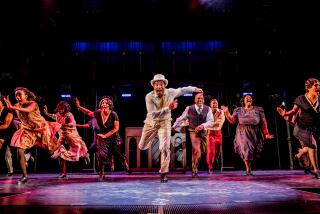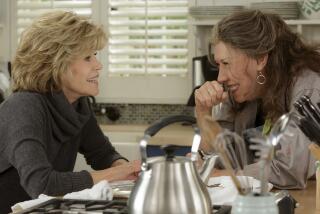A Distant Look at the ‘Jackie’ Legend
- Share via
NEW YORK — As slender as its heroine, “Jackie: An American Life” is a smart-looking and affectionate vaudeville on the life of the world’s most famous Jackie, Jacqueline Kennedy Onassis. What this show is doing on Broadway is a mystery.
In a less stately setting than the Belasco Theatre, where it opened on Monday, “Jackie” might have found some of the success it had in Boston last year. Written and directed by Gip Hoppe, the show is a lighthearted parade of history and familiar images, a stream of bright, broad jokes, starting with Jackie’s girlhood up to her final days. The show stars Margaret Colin and a supporting cast of nine who play a gallery of famous people, more than 100 in number, and a large cast of malleable soft puppets as well, hauled in and yanked off with manic energy. Hoppe has some good punch lines and props, and he has a sleek visual sense up his sleeve. But in the end he has surprisingly little to say about the main event--not Jackie, but our own obsession with her celebrity aura. What he does say is painfully obvious.
One such scene involves the bane of Jackie’s existence, photographer Ron Galella. Egged on by a hysterical editor shouting for more Jackie pics, he metamorphoses into a giant swooping vulture puppet. Jackie, helpless before him on the floor, is rescued by whiny voiced Aristotle Onassis (Thomas Derrah), who wears his pants way too high. In light of the volumes written about the death of Princess Diana, this scene just lies there like a lumpy potato, with about as much to say.
As Jackie, Colin is winning and strikes the right grace note. When she appears in the pink suit of Dallas fame, she provokes gentle gasps from the audience. Ultimately she tells us no more about Jackie than we knew when we came in the theater.
An able political cartoonist, Hoppe is at his best when satirizing well-known events from the Kennedy White House. One of the funniest scenes is a reenactment of the Nixon-Kennedy debate, in which the participants speak only the words you might be thinking while you watch them. Nixon (the wonderful Derek Smith) begins with, “Well, let me just say first off--that I look like an escaped convict.”
Hoppe feels he needs a serious frame for an insubstantial work. A scene in which Truman Capote (the versatile Derrah) advises the heroine, “Mystery, Jackie--that’s what keeps ‘em coming back!” echoes an earlier scene in which her father gives her similar advice, suggesting Jackie’s allure was packaged for her by the men in her life. This would be insultingly simplistic except that it’s so tepidly stated, it’s hard to care.
Though Hoppe obviously has an affection for his subject, his relationship to her remains wan--as wan as his final message to us. In her last New York apartment, Jackie turns her telescope on us and asks how we would feel if she made up stories about our lives without knowing much about us. This is not exactly a pointed offering; we would probably be flattered. While one understands the point that Hoppe was going for, he gets about as near to it as Galella got to Jackie after the restraining order.
* “Jackie,” Belasco Theatre, 111 W. 44th St., N.Y., (800) 432-7250.
More to Read
The biggest entertainment stories
Get our big stories about Hollywood, film, television, music, arts, culture and more right in your inbox as soon as they publish.
You may occasionally receive promotional content from the Los Angeles Times.










